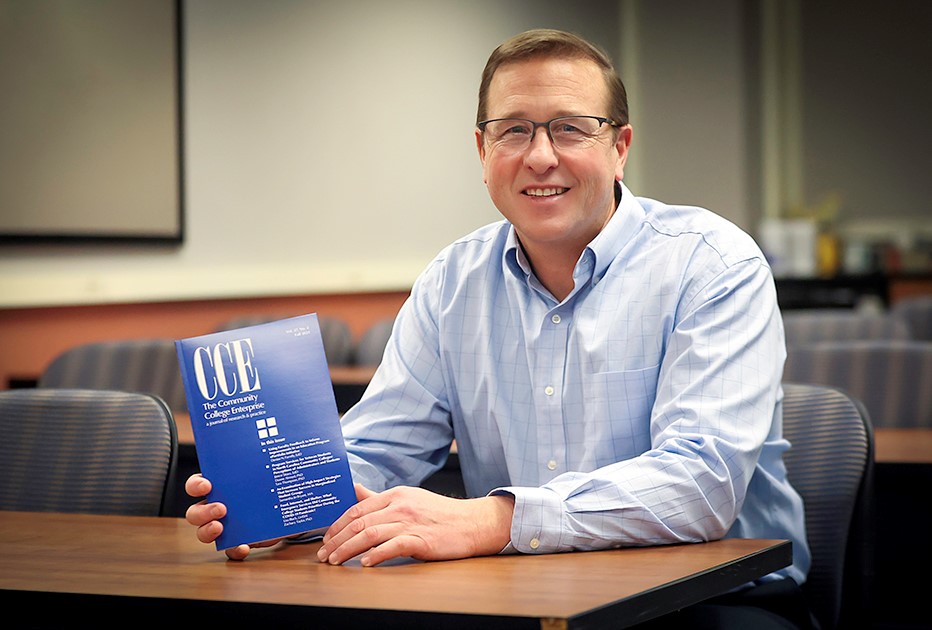This peer-reviewed journal serves an important role for community colleges across the country
Learning, of course, is the goal of any college experience. Part of that education means familiarizing yourself with some unfamiliar terms. Don’t worry, we’ve got you covered.
As part of an occasional series, we’ll explain phrases, lingo or topics to add to your college vocabulary. We call it “Say What?” If there’s a topic you’d like to see covered, please send suggestions to [email protected].
Today, we take a look at The Community College Enterprise, a small but mighty publication that Schoolcraft College has produced for 20 years. Published twice a year (spring and fall), The Community College Enterprise is the only peer-reviewed journal dedicated to community colleges that is housed within a community college.

Dr. Alec Thomson, Professor of Political Science and History, serves as Editor. We thank him for an extensive interview that provided the information for this story.
The Community College Enterprise traces its roots to the Michigan College Journal: Research & Practice, which was first published in 1995. As interest and the audience grew, the journal was renamed to its current title in 2002 and has continued to flourish and place Schoolcraft College in a positive light.
“Launching and supporting this unique endeavor serves as a clear sign of Schoolcraft’s commitment to teaching, learning, and scholarship,” Dr. Thomson said. “No other community college is leading in the way that we are.”
At its core, The Community College Enterprise serves as an important forum for exploring and advancing an understanding of community colleges. Taken as a whole throughout its publication history, The Community College Enterprise is a repository of information with a wealth of useful data and ideas.
“Professors, administrators, and staff looking to pursue innovative projects or simply wrestle with challenges facing their institution are well-served by having a body of research assembled for reference,” Dr. Thomson said.
“Launching and supporting this unique endeavor serves as a clear sign of Schoolcraft’s commitment to teaching, learning, and scholarship. No other community college is leading in the way that we are.”
Dr. Alec Thomson, Professor of Political Science and History, and Editor of The Community College Enterprise
While other publications of this type exist, The Community College Enterprise also distinguishes itself for its accessibility.
“We’ve worked to curate a near complete collection of our print run online at www.schoolcraft.edu/cce with plans to fill in the remaining gaps by year’s end,” Dr. Thomson said. “Beyond our own archives, readers can find us in online databases like EBSCO, ERIC, Gale, and ProQuest. These are important resources for students and professionals who are interested in the scholarship of teaching and learning at community colleges.
“Our focus has always been the accessibility of the publication and its proximity to the subject being studied.”
Expanding the focus
Dr. Thomson’s first role with The Community College Enterprise was as the Book Review Editor in 2005. He became Editor in 2011 and has worked to improve the publication.
“Working closely with Gordon Krupsky (Managing Editor), I’ve tried to have The Enterprise focus on several key initiatives,” Dr. Thomson said. “First, we’ve worked to expand the scope of the journal. Today our reviewers and article submissions hail from all across the country. The journal’s early focus might have been on Michigan, but we are now a nationally recognized and focused publication.
“Second, the expansive focus of the journal meant generating more submissions for publication. Promoting The Enterprise and making connections beyond Schoolcraft has led to an increase in the number and quality of submissions that we receive.
“Third, in addition to receiving more article submissions, we’ve been growing our readership. We’ve rewritten and redesigned our webpages, journal layout, and promotional materials, all with the goal of making it easier and more visible for interested individuals to find us and interact with our staff.
“While the operation relies on a panel of peer-review editors from across the country, the layout, design, review and printing of the journal are all coordinated through Schoolcraft College. Most notably, Gordon Krupsky (Managing Editor), Ione Skaggs (Graphics Designer), and Sakura Keast (Copy Editor) all have a direct hand in shaping every page of every edition.”

An interesting part of looking back at all the research is seeing that many topics remain relevant today.
“For example, the first issue of the journal (1995) featured an article regarding distance learning education,” Dr. Thomson said. “While this is now a common feature of most campuses, at the time the focus was primarily on the telecourse or interactive (satellite) classroom models. The technological tools for distance learning have undergone substantial change, but the core questions regarding best practices for teaching and learning at a distance still remain.”
(Schoolcraft College began its first distance learning courses in 1982. Look for more on our history in an upcoming story.)
Dr. Thomson thoroughly enjoys his role as Editor and looks forward to helping produce many more insightful issues of The Community College Enterprise.
“Aside from seeing the wide-range of research and practices that are being implemented around the country, I truly enjoy looking over the work and comments of our reviewers,” Dr. Thomson said. “I often learn as much from a great reviewer’s comments, insights, and suggestions as I do from the actual article that was submitted.
“Sometimes the takeaway is narrowly focused on some statistical test or research design matter, but in other scenarios there are broad theoretical discussions raised which can really reshape how one looks at the topic. Having this opportunity to constantly learn and observe the work of others is very rewarding.”
Please visit their website for more information on The Community College Enterprise. Scholars interested in serving on the peer-review board or having the work published can email [email protected] indicating their interest.
